Slider
There is a major educational gap leading to the late diagnosis of amyloidosis. Thanks to the ASB providers across the country are being instructed on techniques to suspect and recognize amyloidosis and how to efficiently make the diagnosis in a timely fashion.I strongly support incorporation of the ASB into the curriculum of all medical students, all residents, and subspecialty fellows in cardiology, nephrology, and neurology. Comprehensive education remains the best strategy to save lives for this rare disorder and I am strongly supportive in actively participating in the ASB.
Morie A Gertz, M.D., M.A.C.P. | Roland Seidler Jr., Professor Department of Medicine
Mayo Distinguished Clinician | Mayo Clinic
I had the privilege of participating in a publication on the Amyloidosis Speakers Bureau, which plays a vital role in medical education of students, residents and fellows. Their patient educators are not just knowledgeable but also incredibly passionate about raising awareness and improving patient outcomes for amyloidosis. Their dedication to accelerating diagnosis is truly commendable. I believe that their contributions to medical education are invaluable in the fight against this challenging and rare disease. Thank you to ASB for making a difference in the lives of patients and healthcare professionals.
Vaishali Sanchorawala, M.D.
Director, Amyloidosis Center Boston University / Boston Medical Center
I recommend that your medical education take advantage of the Amyloidosis Speakers Bureau (ASB), a novel contemporary educational resource for today’s medical students and trainees. There has been a paradigm shift in the diagnosis and treatment of systemic amyloidosis. Tomorrow’s doctors need to learn about this. The ASB is designed to make a durable impression on those who will be diagnosing this disease in the not too distant future, because of the quality of their speakers, who are real-life patients, and the up-to-date nature of their extensive educational packet. I strongly encourage you to integrate the resources made available by the ASB into your medical school curriculum and residency didactic. It will make a difference.
Raymond L. Comenzo, M.D.
Professor of Medicine Tufts University School of Medicine
The most critical issue for patients with systemic amyloidosis is the lack of recognition of the signs and symptoms of the disorder by physicians. This results in delayed diagnosis and frankly, the more advanced the disease is at presentation, the sicker the patient is and the harder he/she is to treat – despite having effective therapies. The value of the Amyloidosis Speakers Bureau cannot be underestimated. Patient educators, providing first-hand information to students and trainees is impactful and I believe the most efficient way to spread awareness, improve recognition and ultimately save lives.
Heather J. Landau, M.D.
Bone Marrow Transplant Specialist & Cellular Therapist Memorial Sloan Kettering Cancer Center
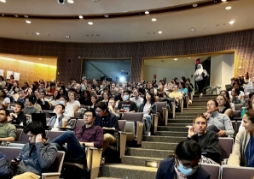
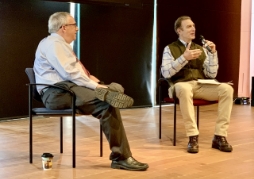
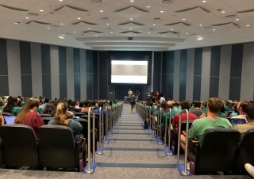
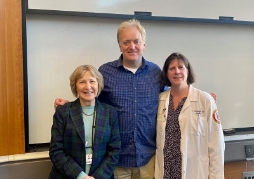
The Amyloidosis Speakers Bureau has given our institution a unique opportunity to educate future healthcare providers on the early recognition of Amyloidosis. The experience of having a live panel to discuss a patient’s journey through diagnosis and treatment has provided an invaluable learning opportunity for faculty and staff. I would highly recommend the Amyloidosis Speakers Bureau to complement any medical teaching curriculum.
George Borrelli, D.O., M.S., FACOEP
Chair. Department of Clinical Integration, Clinical Assistant Professor, Emergency Medicine Midwestern University
The 'Patient as Professor' session is certainly one of the highlights of the cardiology course at Columbia University Irving Medical Center. In listening to the journey of a patient with amyloidosis from diagnosis through treatment, the pathophysiology of a disease process is suddenly brought to life in the stories and insights shared by our wonderful guest speaker. The students gain a deep appreciation for the many physical, emotional, social, and financial implications of chronic disease. As future leaders in healthcare, this invaluable experience also inspires our students to pursue clinical and research activities to advance the field of medicine and improve the lives of patients with chronic illness.
Kerry A. Esquitin, MD
Section Director, Cardiology, The Body in Health & Disease course Columbia University Irving Medical Center
We have hosted a speaker from the ASB for the past two years. The organization is wonderful to work with and offers different options to fit the educational needs of our students. Both the speakers we hosted were wonderful and the feedback from the students was uniformly positive. To paraphrase a student’s comment, “This is an amazing way to raise awareness about amyloidosis…the opportunity to hear from a real person helped to humanize the classroom and was a great learning experience.”
Mohan Ramkumar, MB;BS
Course Director, MS2 Renal Course University of Pittsburgh School of Medicine
This organization is very well-run and professional. The organizer for our session, Deb Boedicker, is exactly the type of person you would want to help organize a session and moderate the panel. She is personable, communicative, and professional. The speakers were engaging, well-informed and also delivered some great first-hand advice to students on how to approach patients. They were quite encouraging and the format of the panel made for a very efficient session.
Kimberly Densmore
Medical Colloquia Coordinator | University of Illinois College of Medicine
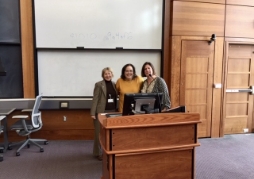
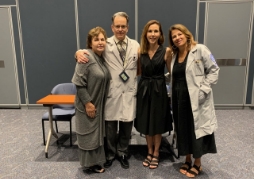
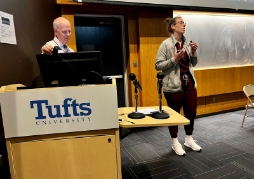
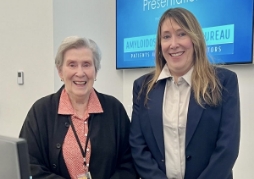
I wanted to thank you for arranging the amyloidosis presentation for our residents. I found the didactic information very useful, and Ms. Perez's discussion was interesting and compelling. She brought to light one of the things that I discuss frequently with our residents - if you are having trouble with a diagnosis or treatment plan, sometimes it's best to take a breath, start over, and look at the available information again. A diagnostic "time out" can be helpful if you are stuck. I find that true in my practice even after 40 years of doing this.
Kurt F. Bruckmeier, MD, FACP
Program Director IM Residency Merit Health Wesley
This integrative presentation about amyloidosis with different speakers involving real patients, trained amyloidosis faculty from dedicated research centers and a visual powerpoint presentation all combined really helped enforce the medical information required to diagnose this condition in our everyday practice. I would recommend it for all residency programs and faculty members - this will greatly help us diagnose amyloidosis more effectively in our day to day practice whether inpatient or outpatient medicine.
Radhika Mehta, MD
UTRGV Internal Medicine Residency Knapp Medical Center
This session was a phenomenal experience which allowed us to combine the patient experience and subject-matter expertise to better train residents on the diagnosis and management of amyloidosis.
Sami Hamdan, MD MPH
Internal Medicine Chief Medicine Resident Tufts Medical Center
Great educational and informative lecture from video with first hand experience with treatment along with struggles from a knowledgeable source. Brought great depth of knowledge to up and coming residents along with up and coming graduates going into the world to look out for amyloidosis.
Amardeep Singh, MD
Chief Resident Internal Medicine Merit Health Wesley
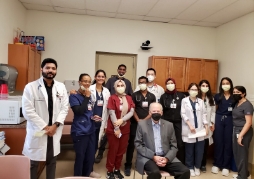
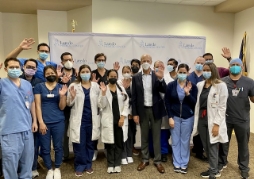
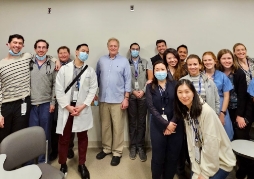
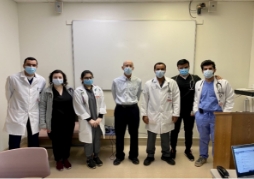
It's one thing to know about the clinical presentation of a disease but to know what the patient experiences while having the disease can be a totally different thing, and can only be truly expressed by the patients themselves. These patient experiences can be harder to understand for us medical students but supportive group talks like this can really help us in understanding how a disease really affects a person from its onset to the present moment.
Ju Oh
MD Candidate | Chicago Medical School, Rosalind Franklin University of Medicine and Science
I believe that this experience can assist other schools and other health professional students to understand the patient's perspective on a disease or diagnosis as well as really put into perspective the knowledge or limited knowledge that we all have as future healthcare professionals. It is incredibly important to humanize the medicine and through panels like these we are able to humanize what we do and really see the impacts, both positive and negative, that a patient may experience which will make us better caregivers.
Vani Ganesh
DO Candidate | Midwestern University / Chicago College of Osteopathic Medicine
This was an incredible experience that gave me the opportunity to learn about amyloidosis from the patient's perspective. This will no longer just be another disease I have to memorize; it's become more personable and I believe I am more likely to recognize it in clinical practice going forward.
Alejandro Ramirez
MD Candidate | Florida International University Herbert Wertheim School of Medicine
As a medical student, I have spoken to several patients and have participated in many patient presentations, but they always seem to miss the mark. We need to hear about the emotional aspects and challenges at home that accompany the journey to diagnosis and treatment. This presentation covered all of that with the clinical information included.
Raymond Stemrich
MD Candidate | Geisinger Commonwealth School of Medicine



